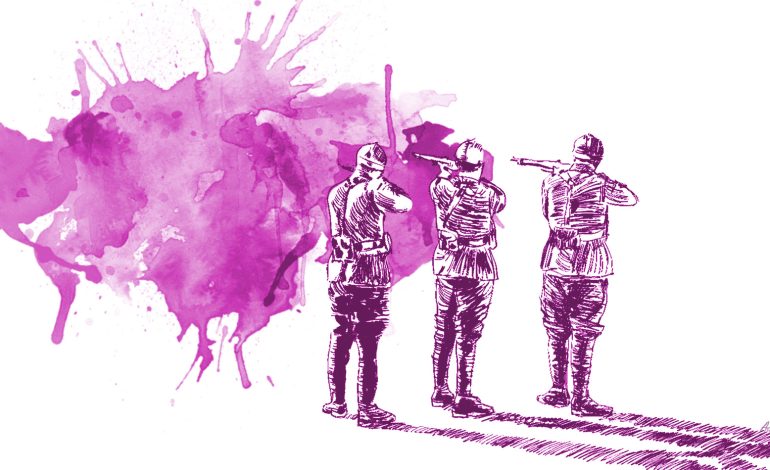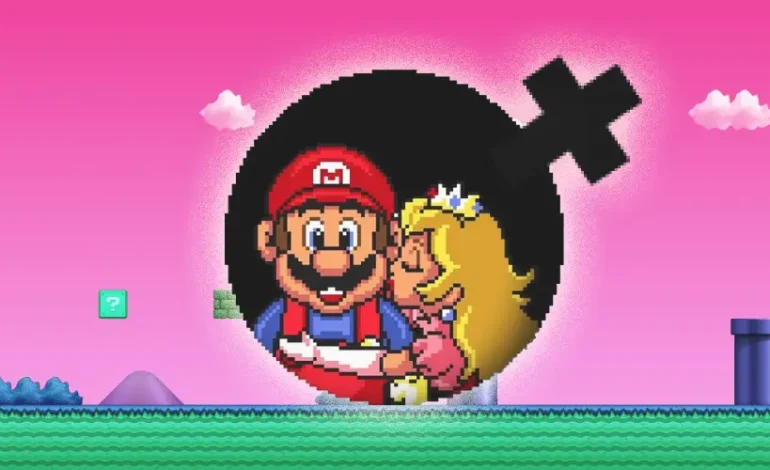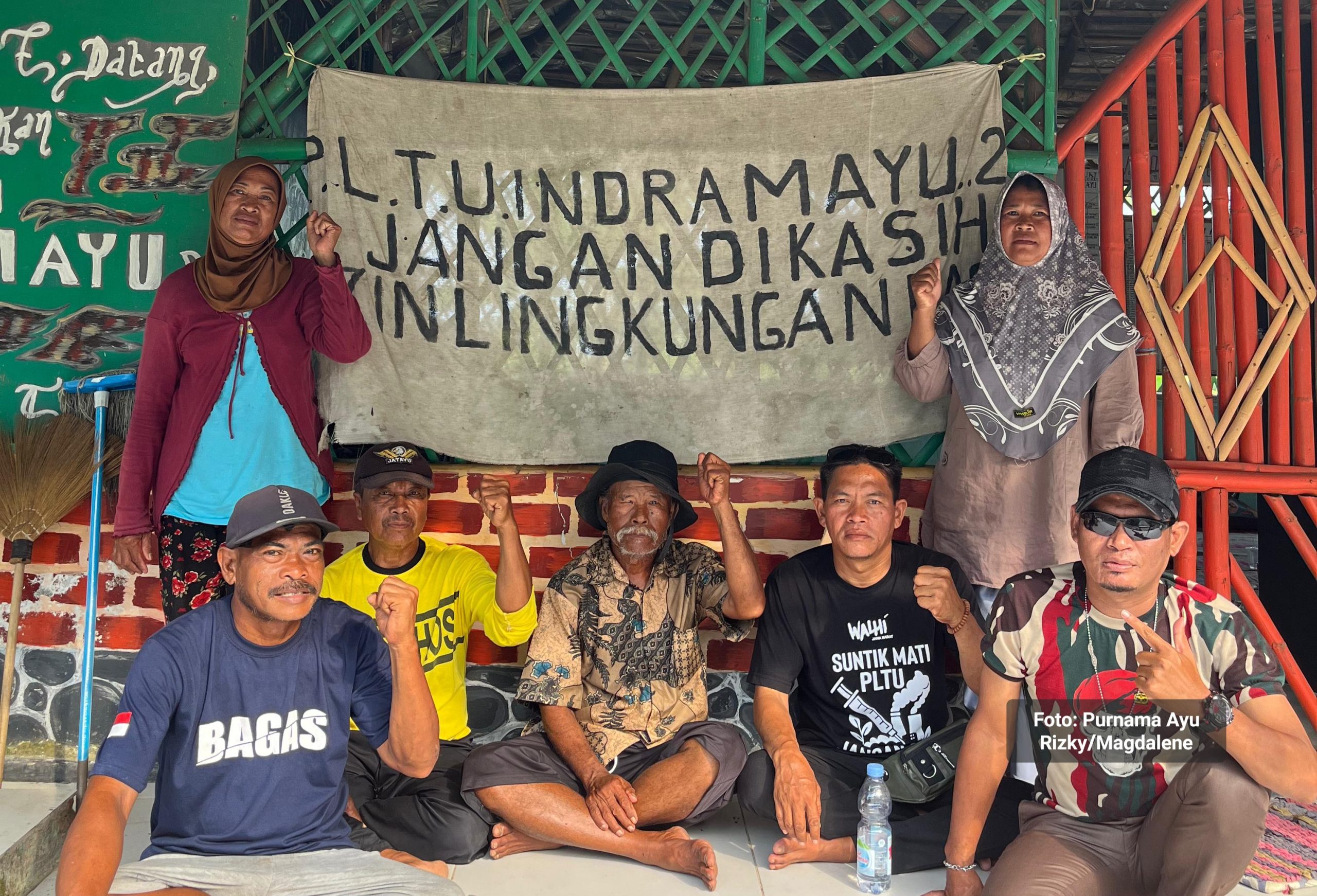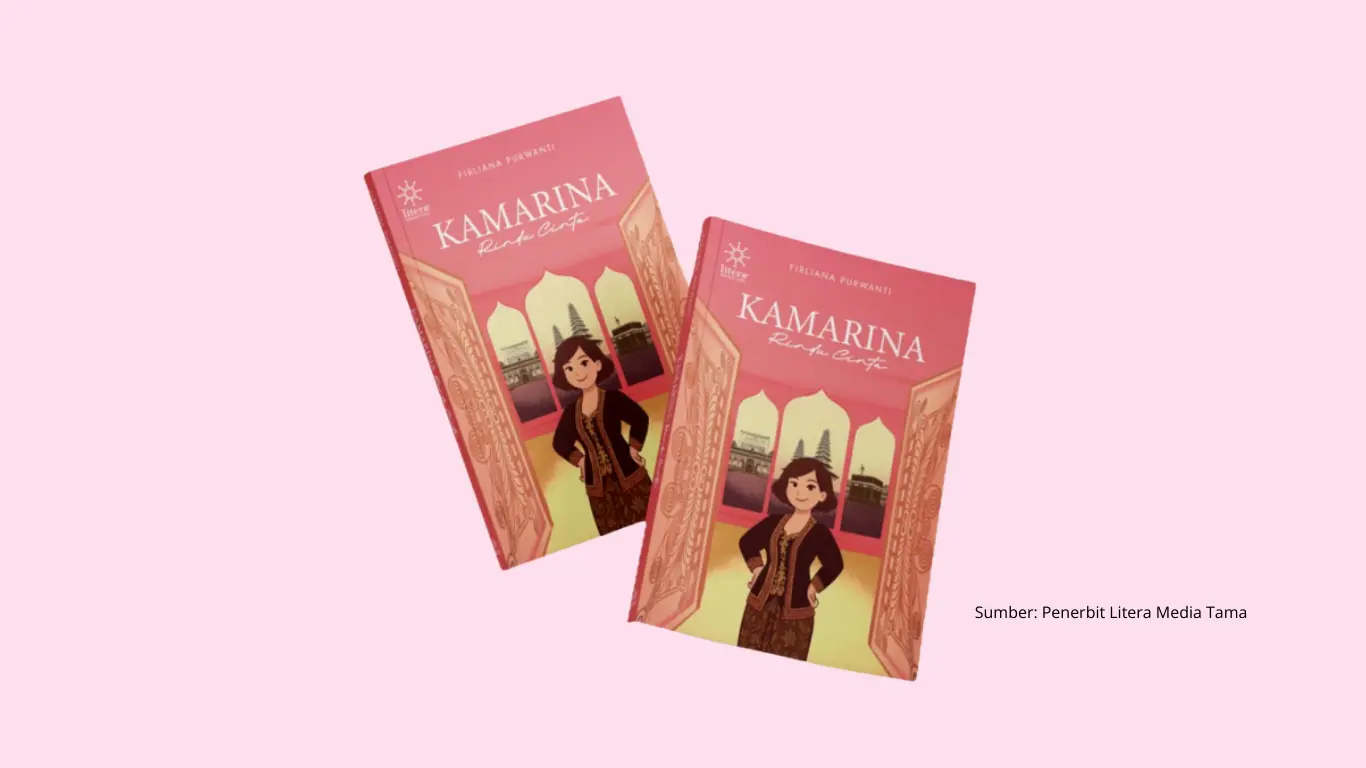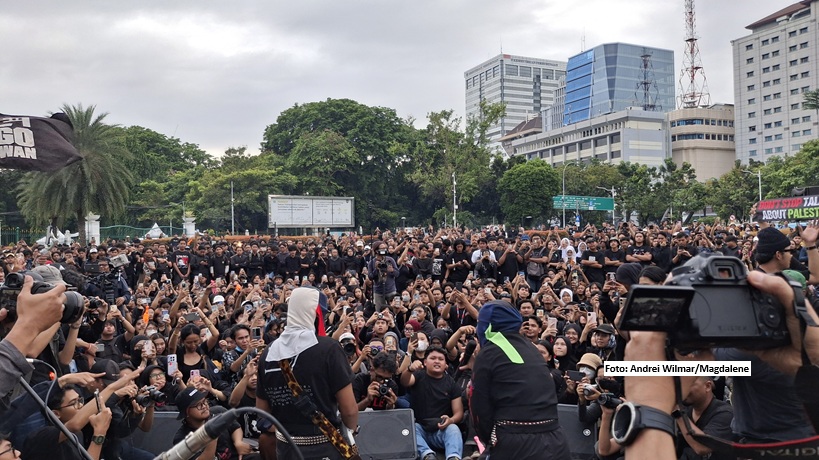Aussie Writer Talks of the Downside of Pop Feminism and Gym Selfie
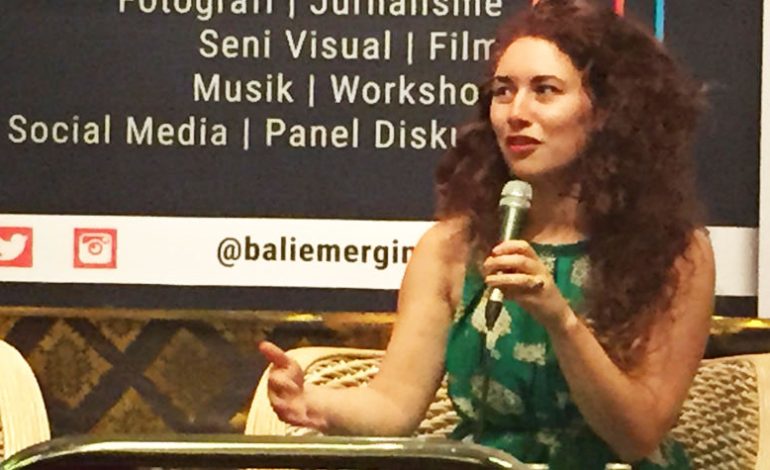
When writer Lou Heinrich introduced herself as a feminist during this year’s Bali Emerging Writers Festival (BEWF) on April 26-28, she would get asked if she hated men, to which she replied with a big, resounding “no”.
“I like men, I’m happily married to one,” said the 26 year old, who was one of the two Australian writers on an exchange program to attend BEWF.
Heinrich writes nonfiction articles on pop culture and women. Her essays have appeared in publications like The Big Issue, pop culture website Spook, literary journals Kill Your Darlings, and Daily Life, a Fairfax media publication. She also edits Lip, an independent feminist website in Australia.
“I’ve been called by critics in my family as a keyboard feminist, where I talk about things and don’t do much,” she said, chuckling. But she sees her writing as a personal journey to explore some of the issues and cultural expectation of her own sex in the hopes of sparking some discussions.
I sat down for an interview with her during the festival, during which she talked about pop-feminism, the double standard of “bad feminists”, and the danger of gym-selfie style of empowerment.
Magdalene: You identify yourself as a feminist writer.
Lou Heinrich: Yeah, definitely. Feminism is about equality for both sexes. I’m of the belief that we live in a patriarchal society – and I always speak of Australia. I live in a patriarchal society where the world is set up to benefit men and to benefit wealthy, white men. And so I want to learn about how that influences the way I live my life, and the way other people live their lives. I’m also interested in deconstructing gender roles and the expectation that the culture enforces us to do. I want to learn about the way my culture creates a desire in me to act a certain way and to be a certain way. Really, it’s about my journey, but I’m at a point, also, where I want to learn about feminism for other people as well. I’m very middle class; I’m a white woman. I want to know more about what feminism is like for aboriginal women, for women who live in poverty. I’m kind of at a cross road in a way, because I’ve only come so far, and I want to learn so much more now.
And what have you found to be the bigger picture? What is the biggest issue that consumes the energy and that drives feminists today?
My desire is to see women and the natural way that women are appreciated as much as the way of men. Not every one conforms to this, but men are generally more decisive. They’re all about the logic, rational thinking. And women are kind of more driven by emotion. This is always the generalization; and there are heaps of people who don’t fit into this. Women are also about the seasons and the rhythms of life. But I guess that’s not as acknowledged or rewarded as the male style of living.
For example, in Australia, probably the biggest thing is the gender pay gap, which is that men are paid more than women. Overall women are paid between 70 and 80 percent of what men earn across different industries. To succeed in many industries or in the corporate world, you are expected to assimilate into the male ways, like being aggressive, instead of nurturing, and rational and logical, which aren’t bad things, and definitely are part of female life too. I would love to see the more feminine part of women rewarded in my society.
How did you get your feminist awakening?
In my family there are always very strong women in different ways. My mom always identifies herself as a feminist. One time when I was a child, I went to the playground and a boy said to me, ‘Climb this structure’. And I said, ‘No, I can’t. I’m just a girl.’ I don’t know where I got that from, but I remember my mom telling me off, saying, ‘Don’t say that! Just because you’re a girl doesn’t mean you can’t do anything.’
So I think that might be my earliest feminist memory. And when I was a teenager I had a sense of outrage. I always felt our society kind of wanted me to conform to a certain thing. I always have to be skinny and have big breasts, and I always have to be attractive and presentable. The most important thing that a woman can contribute to the world is to be sexually attractive. I always felt very angry with that.
I remember in my last year in high school, I was at a party at a friend’s house and there was a row of cars, and we were sitting and talking. And this boy I didn’t like, he had a sticker at the back of his car that said ‘No fat chicks’. So I scratched the ‘fat’ bit, so it said ‘No chicks’, which I knew he would hate. So maybe that was the first time I was a feminist activist, when I was 17.
But then I got involved in organizations. I guess my feminist awakening was around the enforced sexualization of women in media, and therefore in society. That came about when I was 17 or 18. I got involved in an organization that was politically vocal about that sort of things. It really opened up conversations about why is it that the women we see in advertisements on TV all look a certain way. And I read things like The Beauty Myth by Naomi Wolf, which has a theory that our society makes women feel bad about themselves, because it keeps us in our place, where we’re so concerned with the way we look, making ourselves look a certain, acceptable way, that we’re not as politically vocal or socially active to change the world for greater things, like fighting the greater injustice. And also the economy would collapse if women stop buying beauty products.
So that’s the beginning, when I went to university, late teens early 20s. That’s where it all began.
I saw your writing about the commodification of feminism. Tell me a little bit about that.
It’s very interesting, because in many ways it’s good. It makes feminism more accessible. Beyoncé standing at the Super Bowl in front of a big block-letter “Feminist”, and using Chimamanda Ngozi Adichie’s speech in her song “Flawless” – that’s pretty powerful and makes feminism accessible. And for young people to be open to that, I think it’s wonderful. And people like Nicky Minaj, she speaks a lot about women speaking for themselves and making decision for themselves….
…and taking in charge of their own sexuality.
Exactly! Which I think is beautiful.
Is there a downside to that?
There definitely is. I feel that in that scenario of pop stars, it’s just money-making scenario and I feel that there are people who wrote for them in marketing and PR to make sure that they’re always successful and always in the public eye. I feel like it’s actually a technique of those pop stars to join in or charge ahead of the cultural zeitgeist, of what people are wanting, of what people are talking about, and owning it for themselves, but only for the purpose of making money. But Beyoncé herself might disagree with that.
But does feminism sell? Because five years ago people were saying there’s no need for feminism and that’s an outdated concept. What is so attractive about feminism that makes these celebrities think it will advance their brands?
Everyone wants to be empowered, right? In the end it speaks a little truth to, say, a teenage girl, who doesn’t feel like she fits in, and she might want to be an astronaut and her family said you can’t be an astronaut because you’re not very good in science, or she might be the only girl in her science class. And she hears women like pop stars saying ‘You can be whatever you want to do, follow your own destiny’. That’s wonderful.
But I think it’s a watered down version of feminism that sells. I think that Nicky Minaj would have trouble speaking about the deep oppression of women that have happened for centuries and the ways that women were punished for speaking up in days gone by. And how they still are. And also, in the end, those pop stars we’ve spoken about, which doesn’t apply to every famous feminist, they’re all glamorous. So they’re selling glamour and aspirational lifestyle, you know, wealth and beauty, along with a splash of feminism.
It’s just another bling to them.
Yeah, it’s just another ring on their finger. Most of them are really beautiful. So I think when it looks good, feminism is easy to follow. But there are also a lot of not as appealing parts of feminism, which I’m more confronting, because you have to also acknowledge your own privilege, and acknowledge your own responsibility in continuing the systems that oppress other people. That might be the dirty underside of pop feminism.

Photo Courtesy of Bali Emerging Writers Festival.
You also wrote about the beauty paradox. As feminists, we don’t want to fall into the trap of having to look a certain way, but then you also want to look good. Is this a double burden for feminists or what?
It’s massively a double standard. There’s a writer Roxane Gay, she wrote a book called “Bad Feminist”. It’s a wonderful book of essay on cultural criticism and personal essays. Her main point is that no one is a good feminist. She’s a bad feminist – and she wants her man to take out the trash, because that’s a man’s job, even though she knows that’s totally antithetical to the ideas of feminism that we can all do what we need to do by ourselves. So she acknowledges that everyone has a different idea, but there’s no mother ship controlling feminism, because we’re all different people coming from different background. And in the end, there are always going to be contradictions because we’re all humans. There’s always going to be a double standard. That was the point of my essay is that I feel conflicted because it is a double standard. And it maybe a picture of humanity – that I want to be loved and accepted, and part of that is through the way I look. And then I also resent that.
But do we need to resent that, or like you said, we should just accept it, this is the way it is? And, anyway, when we pay attention to and like the way we look, that’s a sort of an empowerment in itself, right?
I can’t say we should do this or that; I can only speak for myself. But in the end, I don’t desire to participate in the beauty culture, the endless money you can spend, in terms of consumerism, and the way we speak of other women. I want to participate as little as possible, in the economy of it.
But I also feel like the way I look is almost an expression of myself, of my creativity. Ever since I was young, I wanted to stand up, so I always do my make-up bright and different. And that, again, might reveal part of my humanity. But, yeah, I think in the end, the biggest thing I’ve learned is that when you judge yourself on your own standards of beauty, that’s when you decide to be beautiful. Because when you judge yourself on the standards of beauty that are presented to us in the media – in the movies and TV shows, the bodies that we see in porn that’s mainstream, the bodies that are very normalized – then we’ll never be good enough. And also there’s a huge drain. It drains your energy and attention and in the end, in that scenario, you have to choose to be beautiful and decide what that is for yourself
Also, you talk about the gym-selfie culture. I just read an article recently about how strong has become the new skinny. And how many women aspire to do marathon and cross fit, whatever that makes them physically strong, which is good in a way, but is there a downside to that?
Personally, I have a problem with the whole gym culture. I mean because, number one, it’s all about the aesthetics. It’s all about the way you look. All the fitspiration on Instagram, you very rarely see a woman who’s not incredibly thin, and who doesn’t have a bust, as the aspirational image. So it’s still 100 percent about body conformity.
I’ve done fitness before, I’m not very committed to it at the moment, but when you have input into your body and you work on yourself to be stronger, it feels great because you invested in yourself in that respect. But I’m not happy with that culture, I think it’s quite poisonous, because it’s so appearance-base and you’ll never be happy because you’ll never be good enough. No matter how thin you are, no matter how many weights you live, there’s always someone better.
I’m interested in the way the whole clean eating and fitspiration thing kind of lines up with a moral superiority. It’s like, ‘Look, everyone on social media, I’m running 5k; I’m running 10k – I have control over my body. This is what I do.’
I want my friends to share their goals and to share when they do good stuff on social media, but I think because we live in such a public-sharing culture, it becomes a thing that you do almost to prove yourself. It’s another way to find worth, and it’s exterior base. For a lot of people maybe it’s about finding worth within yourself because you can do things that you never thought you could do. But I think that, still, a lot of the culture is about telling everyone what you do.
As to everything there’s good sides and bad sides. I just tell you I don’t follow any fitspirational gym on Instagram, because I cannot stand the tone of it, like “Never give up!” I mean, totally, it’s true: don’t give up. But when you’re vomiting because you’ve worked out to hard, that’s your body telling you you’ve gone too far. Love your body and treat it well, instead of trying to control it.
I do yoga a little bit. My teacher is in her 70s and we do it at the back of her house. That’s about becoming one mind and body. Incorporating your whole self. That’s a big thing to me, because I was never a sporty person. I felt always at odds with my body. It’s just a thing that I’m in. But through learning to breathe, the power of my mind has a lot of influence over what my body can do, within limits. I find it really wonderful to work in harmony, body and mind work together. But I feel that maybe in the gym culture it’s mind conquers body. Maybe even a form of body hatred, and not loving yourself.
There’s a movement now to include men in the goal of feminism.
I think that’s wonderful. Number 1, I think that men are victims of the system too. They’re not as oppressed as women are, but their attitude that ends up oppressing us are created by the system as much as our own are. So it’s about educating men. Sometimes there’s a debate, because sometimes men would take over discussions about feminism. I think the best thing is that men would listen to women because, traditionally, women have not been listened to over history. Men’s voices are always the ones we heard.
My husband calls himself a feminist. A lot of men I know would call themselves feminists because they believe in equality for all people. And they’re actually open to questioning their own behavior and the world around them to make it a place that’s more equal to women. And part of feminism is about deconstructing and understanding gender roles. I like to learn about masculinity and how it compels a lot of men to act a certain way in order to fit in and conform in the same way that women do.
Again, it’s making feminism fashionable, because famous people, actors and stuff, are holding up the #heforshe sign in photos. It’s good to make feminism more accessible for all people.
Lastly, what would you like to say to our readers?
Always questions what’s expected of you and learn to love yourself. Once you learn to love yourself, you almost give permission for people around you to do the same thing.
Read Devi’s State of Women column on Kartini Day and follow @dasmaran on Twitter.

